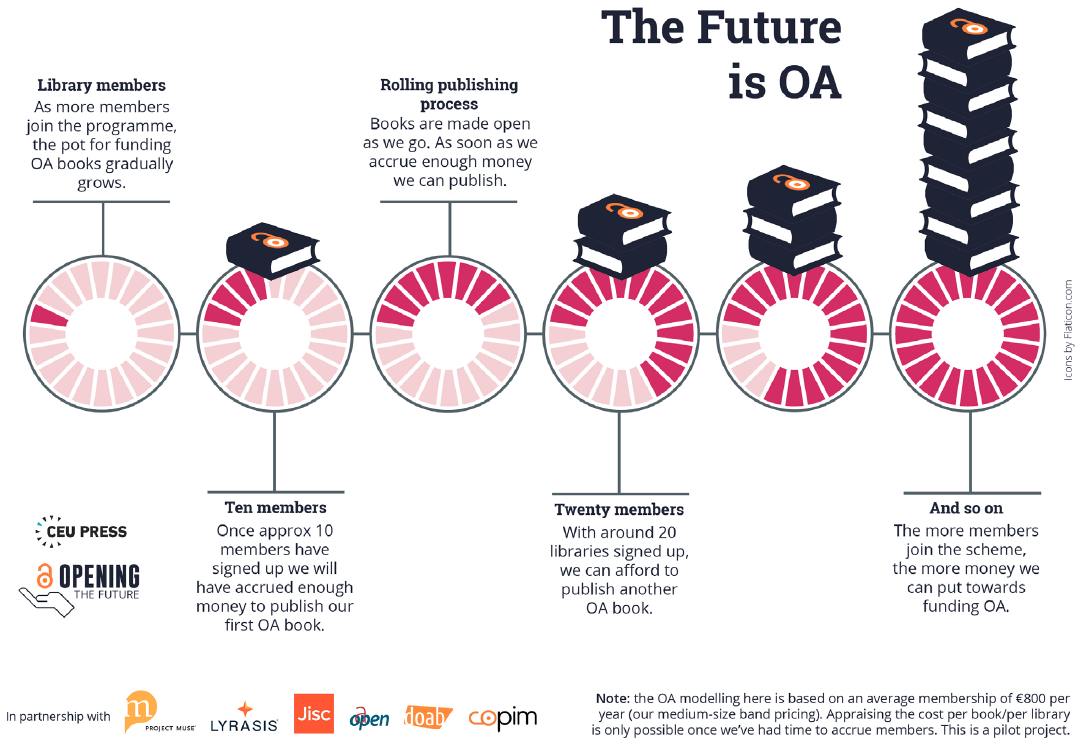Delivering the Closed Backlist & OA Frontlist Content
Delivery of the OA content funded by OtF
It is imperative that the selection process for open access books be transparent and trustworthy. Libraries fear that publishers will select books for the open access route that they believe will not sell, thereby implicitly devaluing open access.
We recommend that Opening the Future presses adopt a strict chronological hierarchy for the selection of the next open access monograph. In other words, at the moment when sufficient funds have accumulated to make another book open access, the chosen volume should be the book that is next scheduled in the current production schedule, but which hasn’t yet been announced as OA vs. non-OA.
Take a look at the Organisational Partnerships section of this toolkit for details on where you can host and promote your OA books.
Avoid 'Double Dipping'
Your new frontlist titles will likely be at first planned as traditionally-sold ‘closed’ books. But as soon as you have accrued enough library support through OtF to fund an OA book, you should change the metadata before any sales are made and move the book to an OA status with any distributors too. This needs to happens well before the book is published: we’ve estimated between 2-3 months is workable. Again, transparency and trust is at the heart of this: if libraries are asked to pay twice through buying a 'closed' copy before it then flips to OA then they will perceive this as double-dipping.
Many OA publishers continue to sell print editions and digital retail editions of their OA books and indeed the Ithaka S+R Print Revenue and Open Access Monographs Report from September 2023 (written in collaboration with the Association of University Presses) suggests that "OA titles can generate significant print revenue [and] OA titles can generate meaningful digital revenue".
- You can read the Ithaka S+R report here if of interest 👉 https://doi.org/10.18665/sr.319642
The contents of your backlist packages should not change
Don't be tempted to bait and switch with the backlist package: library members need assurance that they are getting what they originally paid for. Once they have access to a package, don't change its contents or withdraw it unless they cancel. There are also technical considerations around ensuring consistent metadata is delivered to and from Project MUSE.
As more members join, frontlist books can gradually be published OA
If multiple books are on the same production schedule, the Press has latitude to select which book will be OA, but we would urge transparency around this process and for the Press to issue a justificatory statement of the title’s worth in such instances.
All new frontlist titles therefore could be first planned as traditionally-sold ‘closed’ books and as soon as the press has accrued enough library support to fund a book, the metadata should be changed before any sales are made. The distributors should then move the book to an OA status. This should happen well before the book is published.
This process, in which titles are selected prior to being sent to any third-party intermediaries, means that there is a long lead time for Opening the Future presses, before a book is made OA. However, by doing so, we completely avoid any allegations of double dipping through the provision of misleading data about title availability.

